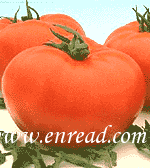| ||||||||||||||||||||||||||||||||||||||||||||||||
|
世界上最受欢迎的水果是什么?猜不出来吧,是番茄!你一定纳闷:番茄不是一种蔬菜吗?错了,错了。到底是怎么回事呢?就让下文为你一一道来吧。 The tomato is the world's most popular fruit. And yes, just like the brinjal and the pumpkin1, botanically speaking it is a fruit, not a vegetable. More than 60 million tons of tomatoes are produced per year, 16 million tons more than the second most popular fruit, the banana. Apples are the third most popular (36 million tons), then oranges (34 million tons) and watermelons (22 million tons). Tomatoes were first cultivated in 700 AD by Aztecs and Incas. Explorers returning from Mexico introduced the tomato into Europe, where it was first mentioned in 1556. The French called it "the apple of love," the Germans "the apple of paradise." Tomatoes are rich in vitamins A and C and fibre, and are cholesterol2 free. An average size tomato (148 gram, or 5 oz) boasts only 35 calories. Furthermore, new medical research suggests that the consumption of lycopene - the stuff that makes tomatoes red - may prevent cancer. Lycopene is part of the family of pigments3 called carotenoids, which are natural compounds that create the colours of fruits and vegetables. For example, beta carotene is the orange pigment4 in carrots. As with essential amino acids, they are not produced by the human body. Lycopene is the most powerful antioxidant in the carotenoid family and, with vitamins C and E, protect us from the free radicals5 that degrade many parts of the body. The scientific term for the common tomato is lycopersicon lycopersicum, which mean "wolf peach." It is a cousin of the eggplant, red pepper, ground cherry, potato, and the highly toxic6 belladonna, also known as the nightshade or solanaccae. There are more than 10,000 varieties of tomatoes. Tomatoes are used in many food product, including, of course, tomato sauce (ketchup), pasta and pizza. According to a Steel Packing Council survey of 1997, 68% of chefs use canned tomatoes for convenience, quality and flavouring. botanically: 植物学的 Aztecs: 阿芝台克人 Incas: 印加人 fibre: 纤维素 cholesterol: 胆固醇 lycopene: 番茄红素 carotenoids: 类胡萝卜素 beta carotene: β胡萝卜素 belladonna: 颠茄 nightshade, solanaccae:茄属类植物 pasta: 意大利面 点击  收听单词发音 收听单词发音
|
||||||||||||||||||||||||||||||||||||||||||||||||
上一篇:“一窍不通”怎么说? 下一篇:谁翻译了“可口可乐” |
||||||||||||||||||||||||||||||||||||||||||||||||
- 发表评论
-
- 最新评论 进入详细评论页>>




